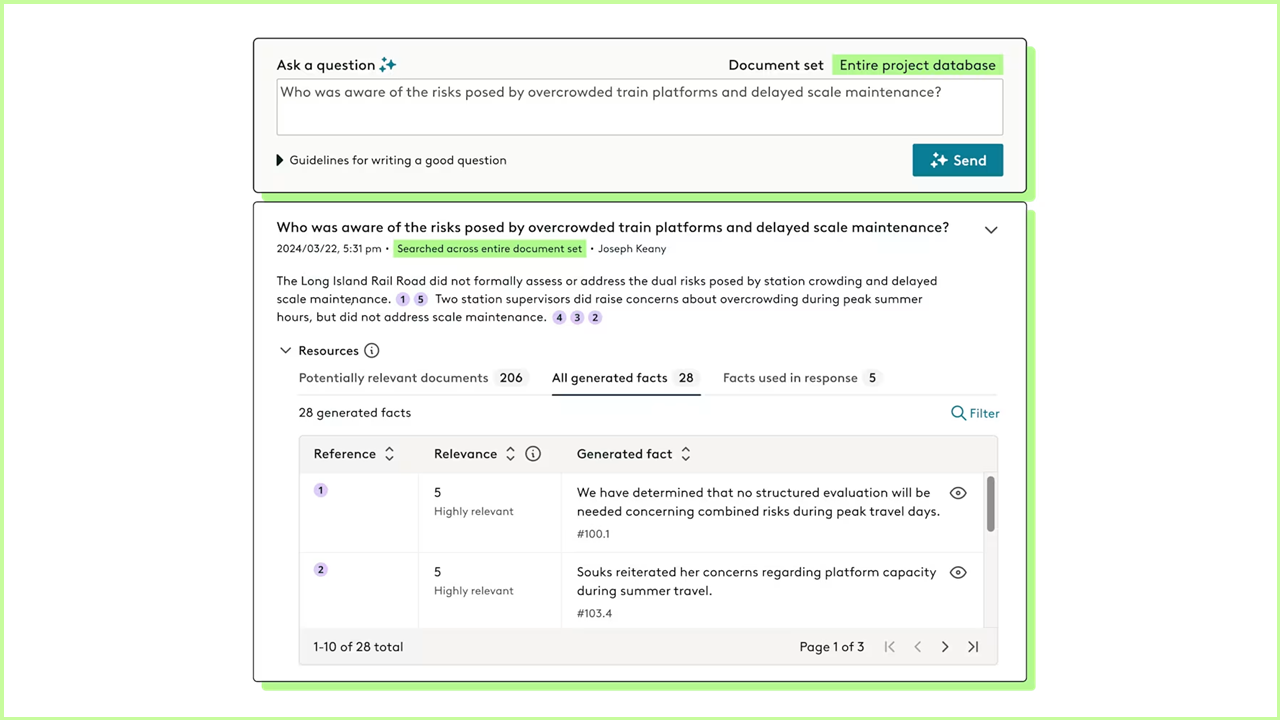As I continue to play catch up on some of the news announced during ILTACON, the e-discovery company Everlaw made two notable announcements there: The expansion from private to open beta of its AI Deep Dive, a tool that can answer complex questions about large document collections, and its having secured FedRAMP certification for its AI Assistant features.
Deep Dive Moves to Open Beta
Deep Dive, which the company had previously code-named “Project Query,” allows legal teams to query entire document corpuses in seconds using natural language questions. The tool synthesizes answers grounded in facts extracted from specific documents, providing citations and access to underlying source materials for verification.
“Deep Dive helps legal teams uncover insights in an entire corpus of data sooner by simply asking questions related to specific issues, parties, or events and get answers in just seconds,” the announcement said. “Answers are supported with a list of facts and referenceable resources so users can dive deeper into the breakdown of information available as part of the response.”
During a media briefing at ILTACON, Everlaw CEO AJ Shankar demonstrated the technology using the 1.3 million document dataset from the Mallinckrodt opioid litigation. He showed how the AI tool processes queries by first identifying relevant document subsets, extracting pertinent facts, scoring their relevance, and then synthesizing responses with full citations.
When Shankar asked Deep Dive how opioids work, for example, it returned what appeared to be a scientifically grounded explanation, drawn from documents within the corpus, complete with citations to the specific documents containing the information.
Transparency and Verification
The tool works by first identifying roughly 10,000 potentially relevant documents, then narrowing them to approximately 50 of the most pertinent sources. From these, it extracts and scores specific facts, showing users exactly which documents support each claim and allowing them to verify the underlying sources.
“We want to be very transparent to the user,” Shankar said as he clicked through screens that showed relevance scores and document excerpts, “so you can check up on the site, you can look at this specific document and the request.”
At the same time, Shankar was candid about the system’s limitations. “Does that mean that it gives you great answers every time? Absolutely not,” he said. “… Just as you’d check the facts if an intern or associate brought you something interesting, you want to check the facts here.”
However, one check built into the system is that, if insufficient evidence exists within the document set for it to answer a question, it will tell you so, answering, “No promising answers were discovered.”
Shankar also noted that Deep Dive is not suitable for comprehensive document review or privilege determinations – Everlaw has other AI tools designed for those purposes.
“I would not use it in relevance or privilege review because those are casting wide nets,” Shankar explained. “Your obligation in relevance is pretty broad. You don’t want to miss things.”
Noting that Everlaw already has a constellation of products designed to help with document review, timeline creation, information synthesis and more, Shankar said Deep Dive is yet another approach, with its own time and place, and yet is perhaps “the most transformative.”
“We expect it to be essential for many large cases over time,” he said. “It’s not going to solve all your problems, it’s not going to solve discovery, but it’s going to be able to help guide discovery at every step of the way.”
Under the Hood
Everlaw’s Deep Dive uses retrieval-augmented generation (RAG) combined with sophisticated reasoning models, including OpenAI’s o3 model for analysis and synthesis, Shankar said.
In developing the product, he said, Everlaw’s strategy was to leverage the “billions and billions of dollars” invested by foundation model providers, with Everlaw’s developers focusing on implementation rather than on reinventing the wheel.
They worked closely with Google on advanced embedding models and maintain commercial agreements with all major AI providers, including OpenAI, with the goal of positioning themselves to use the best available tools as the landscape evolves.
Documents are processed into chunks of 200-300 words with overlapping context windows to preserve meaning across sentence and paragraph boundaries.
The system typically analyzes around 10,000 documents before narrowing results to approximately 50 most relevant sources. Shankar noted this limitation is by design rather than technical constraint: “The bigger the set, the lower the signal to noise ratio of the facts.”
Potential Use Cases
At the briefing, Chuck Kellner, senior strategic discovery advisor at Everlaw, outlined three “out of the box” use cases for Deep Dive:
- Last-minute deposition preparation, especially in the face of a last-minute data dump from an unfamiliar opposing party.
- Early case assessment to determine litigation strategy, allowing legal teams to quickly probe their documents for evidence supporting or undermining their positions.
- Improved planning for document review based on actual case content rather than assumptions from complaints or other pleadings.
The tool has been tested across 49-50 matters in private beta, with document counts averaging 150,000 per case and ranging up to 10 million documents. User testimonials included a case where attorneys immediately discovered a previously missed key document during an onboarding session.
Future Development
Planned enhancements for Deep Dive include more sophisticated query planning, conversational threading to build on previous questions, and expanded context analysis, Shankar said.
The company expects to announce general availability later this year, though no specific timeline was provided.
FedRAMP Certification
Separately, Everlaw announced forthcoming FedRAMP certification for its EverlawAI Assistant, its suite of generative AI tools, enabling federal government agencies to adopt the platform’s generative AI capabilities.
The certification, which Everlaw expects to receive in September, covers its gen AI features Review Assistant, Coding Suggestions, and Writing Assistant.
Everlaw said this makes it the first e-discovery vendor to have its full portfolio of gen AI features FedRAMP authorized.
 Robert Ambrogi Blog
Robert Ambrogi Blog